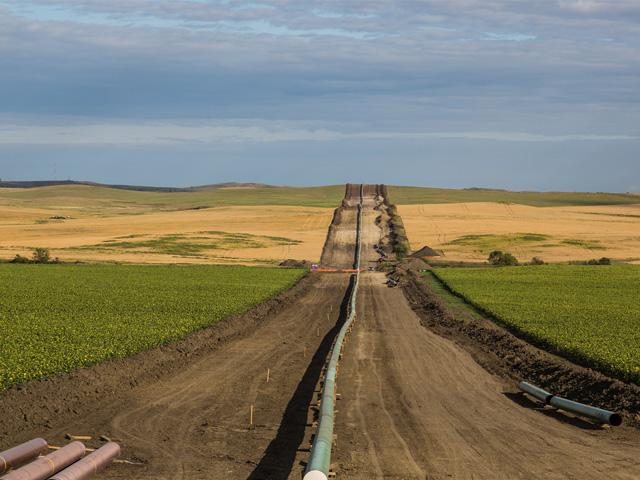Dakota Access Pipeline to Stay Open
Federal Court Rules Corps Violated Law on Pipeline Easement
OMAHA (DTN) -- The Dakota Access pipeline will remain operational, though a federal court this week ruled the U.S. Army Corps of Engineers violated the law by conducting work without an easement.
The U.S. Court of Appeals for the District of Columbia Circuit ruled, however, the pipeline could continue operating while the Corps of Engineers completes an environmental impact statement on the project. The court ruled the Corps had violated the National Environmental Policy Act.
The Dakota Access pipeline was constructed underneath Lake Oahe, which was created when the Corps of Engineers flooded thousands of acres of Sioux lands in the Dakotas by constructing the Oahe Dam on the Missouri River.
The lake provides several successor tribes of the Great Sioux Nation with water for drinking, industry, and sacred cultural practices. According to the Mineral Leasing Act, the pipeline could not traverse the federally owned land at the Oahe crossing site without an easement from the Corps.
However, the court stopped short of ordering the closure of the pipeline.
"Dakota Access believes that the district court's assessment of a shutdown's economic impacts was far too rosy and that the court 'ignored' a shutdown's environmental consequences," the court said.
P[L1] D[0x0] M[300x250] OOP[F] ADUNIT[] T[]
"But the court considered all important aspects of the issue and reasonably concluded that the harms were less severe than the Corps and Dakota Access suggested. In any event, Dakota Access' assessment of vacatur's consequences is undercut significantly by the fact that we agree that the district court's shutdown order cannot stand."
In December, 14 states alleged in a brief the closing of the pipeline could hurt agricultural economies in the Midwest because of expected cost increases to ship grain.
In an amicus brief filed with the court, the states of Indiana, Montana, Iowa, Kansas, Kentucky, Louisiana, Missouri, Nebraska, Ohio, South Carolina, South Dakota, Utah, West Virginia and Wyoming sided with agriculture interests, the pipeline company and the Corps of Engineers.
If agriculture has to compete for railway and truck service, the brief said, agriculture will face "intractable railroad congestion, rotting grain, higher food prices and, ultimately, a potential for food shortages."
Also filing separate amicus briefs were the North Dakota Water Users Association, Western Dakota Energy Association, the state of North Dakota, North Dakota Farm Bureau, North Dakota Grain Dealers Association, North Dakota Grain Growers Association, South Dakota Grain Growers Association, South Dakota Farm Bureau Federation, South Dakota Grain and Feed Association and the South Dakota Soybean Association.
A district court last summer ordered the pipeline closed as a result of permitting issues with the construction of the line dating back to 2017. On July 14, 2020, the appeals court ruled the line could remain open pending an appeal.
Agriculture groups have told the court a permanent shutdown of the pipeline would have devastating consequences for farmers.
The groups are concerned closing the pipeline could drastically increase the costs of transporting commodities. According to the groups, railroads transport 72% to 82% of North Dakota's crop output.
From April 2016 to February 2017, Native American and other groups protested the construction of the pipeline running from the Bakken oil fields in western North Dakota and crossing the Missouri and Mississippi rivers to southern Illinois.
Part of the pipeline runs near the Standing Rock Indian Reservation. Protests centered on concerns about the pipeline's effect on water supplies used for irrigation, drinking water and threats to ancient burial grounds.
The appeals court ruled the Corps violated environmental law in 2017 when it allowed the pipeline owner, Energy Transfer, to build beneath South Dakota Lake Oahe.
Todd Neeley can be reached at todd.neeley@dtn.com
Follow him on Twitter @toddneeleyDTN
(c) Copyright 2021 DTN, LLC. All rights reserved.




